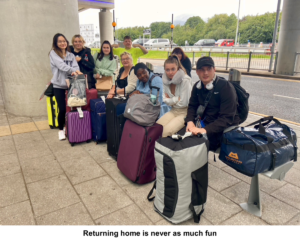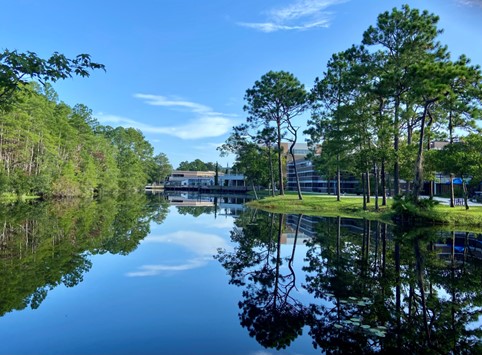Written by Dr Paul Sander, Centre for Applied Psychological Science
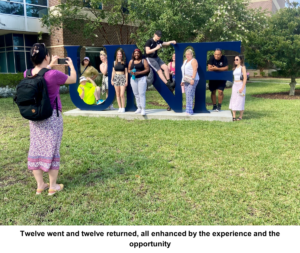
In the late Spring of 2023, on account of my interest in and commitment to the psychology of culture and to multiculturality in education, I became involved in the visit of a group of students and accompanying academics from the University of North Florida. To that end and working with an esteemed colleague, Jo Irving-Walton, Centre for Social Innovation, a programme for their days here was put together which included time in classrooms listening to talks about forensic psychology, the UK education system, and the process of reflection, along with opportunities to meet students and members of the school’s teaching teams. The highlight of the programme seemed to be the visit we put on to Billingham South Community Primary School but, it should be noted, that was much more due to the charismatic nature of the headteacher and the wonderfully effective school than anything we did.
The week must have been a success by some measures as a return trip was hastily organised for late in the summer. In response to Blackboard announcements within the School of Social Sciences, Humanities and Law, the Department for International Development selected ten students, all of whom happened to come from the Psychology Department whom Jo and I met, for the first time as a group, outside The Curve at 5am on a Sunday morning from where we set off for Jacksonville, Florida.
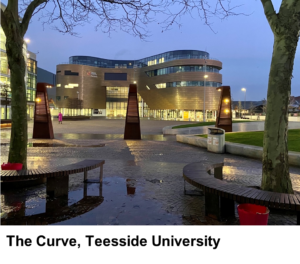
I would challenge anyone to say that long haul flying is fun but the Virgin Atlantic cabin crew were happy to make me Lemsips. I had sadly contracted some quite vicious viral infection just before leaving which, jokingly, I blame the haircut that I had in preparation for the hot and humid conditions that were to come.
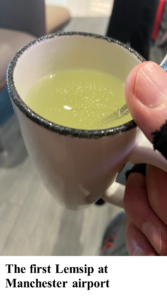
We had a long stopover in Atlanta, Georgia where my luggage decided to stay for an extra night, finally arriving at Jacksonville after a 24-hour journey. We were fortunate enough to be met by our academic contacts from the University of North Florida who ferried us and our luggage, or, in my case without my luggage, to our accommodation. The students had the best deal with a week in the Osprey Fountains student accommodation complete with swimming pool, games room, and a campus location. Meanwhile, Jo and I ended up in a motel, some three miles away.
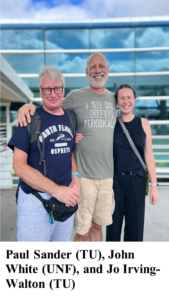
Pushing the jet lag aside, and the virus as far as possible whilst keeping firm hold of the Lemsip, which by now had become Theraflu, we engaged with a week full of academic and leisure activities. Charming and engaging, John, told the students about education in Florida and the USA and then made the mistake of asking what they would like to do next. A visit to a quintessentially American experience was organised: Target! On other days, there were opportunities to visit the university’s preschool and a trip for some to the beach.
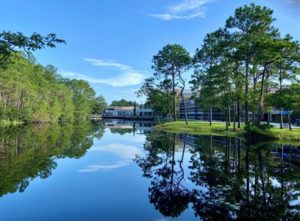
(image University of North Florida campus)
A day was given over to a fascinating drive to the Ichetucknee Springs where we were able to lazily float down the river for over an hour, admiring the forest canopy and the river life.
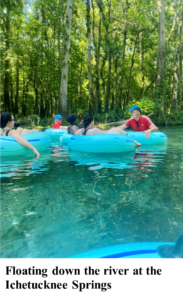
There was a day of psychology related talks and activities which convinced me that I needed a driving simulator for my research, and another day to social work. In both the psychology and social work days, the Teesside University students had ample opportunity to meet and talk with students from the University of North Florida which both parties seem to greatly appreciate.
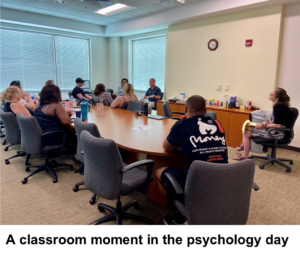
The week in Florida was not without its complications. A visit to the British Consulate in Orlando had to be made as a passport got damaged in a sudden tropical storm. Another got lost in the JF Kennedy airport (New York) on the way back but fortunately the person who found it helpfully took it to the correct departure gate meaning that the student was able to fly back to the UK with us. Some students adjusted better than others to the stresses of being a long way away from home and in a very hot and very humid climate, as well as somewhat alien culture but all ten students were returned home.
Towards the end of the week, I asked the students to leave me some feedback on Padlet about their trip. In their own words and in response to “What are you valuing the most from this trip to North Florida University?” Responses included:
-
- Just a few years ago I couldn’t even go into a shop alone and was very close to having to drop out of education so my confidence was massively low, however this trip has helped my confidence grow and I feel much more comfortable talking to and meeting new people and experiencing different things. I now feel able to travel more on my own.
- What I’m most valuing is the experience of being my own person and gaining new insights of how America teaches.
- I’m valuing it entirely. I think with being older than most I may not have the continued friendship like some will have made but each person has been with me during something so challenging but rewarding and everyone has a place in my heart.
- It has been an opportunity to visit a part of the USA I would never of thought about coming to Jacksonville, but so glad I have, it’s beautiful, but I’ve been learning how a lot of Americans come to this part as it has a lot of opportunity for them, the culture is so different to what is our norm, how different the size of the university is compared to Teesside. Student subjects are taught different to ours. And this is something I will talk about for a very long time.
- Gaining confidence, experiencing different culture, visiting a different uni, seeing what life is America is really like.
- The thing I’m most valuing about this trip is having the once in the lifetime opportunity to come and visit the USA, normally back home I wouldn’t be able to get away to a different country, I also value the opportunity to study in a different culture and to see how they do it
The students were also asked what they were finding difficult. In their own words:
-
- I’ve found flying and the heat difficult!
- What I find most difficult is being away from family and not been able to see them all the time.
- The thing I’m finding difficult is adjusting to the time differences/jet lag.
Finally, I asked the students what they would do differently if there were a next time. In their own words:
-
- Do different, the time of year of the visit, just so I could see more student in classes, how different to how ours run. Visit more local culture see more what Jacksonville has to offer.
- Next time, explore more and maybe have the chance to make American friends.
- If I was ever lucky enough to be here again I’d want it to be for longer so I could see even more.
- If I was going to do anything different it would be coming while the students were still in term time so we could see the lectures and if they learn differently than us.
- Next time, explore more and maybe have the chance to make American friends.
The evidence is that the students benefited considerably from the opportunity and were aware of how fortunate they were to be selected for this heavily subsidised and selectively targeted visit to the University of North Florida. The informal conversations I had with the students and the comments I heard all tend to support this. So, notwithstanding lost and damaged passports, this was a successful trip both educationally and culturally by opening the students’ eyes to a different world. It was an honour and a privilege to have accompanied them. However, the benefits extend much further. The talk was of semester length student and teacher exchanges which would be a fabulous opportunity for students, especially if, ERASMUS style, they could bring credits which counted towards their degree, back with them and the professional benefits for teachers and researchers could be enormous, especially in terms of trans-Atlantic research collaborations.
Beyond that, it emphasises that culture should never be far away either in research or teaching in the social sciences, humanities, and law. In the social world, people are not the same all around the world as different cultural and social environments program them differently (for an example, see here). Within academic psychology, what is presented as The Psychology of Social, Developmental and Cognitive Processes is really just the psychology of social, developmental and cognitive processes in the culture in which the research was done, almost always in the rich, largely individualistic, small familied, and areligious global north. Even two countries so seemingly similar as the United Kingdom and the United States of America are culturally quite distinct. It is hoped that the developing link between Teesside University and the University of North Florida would put culture centre stage in the teaching that happens in both universities which, in turn would stimulate research in Cultural Psychology and Cross Cultural Psychology as well as within other school departments.
